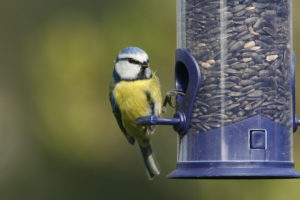
Attracting birds to your garden is easy: supplement naturally available food with bird food, and watch them flock in! Remember to keep feeders and tables clean, so the birds stay healthy and disease-free, and position your feeders in a relatively open area away from predators – the birds will feel safer and visit more!
Make sure food is available at all times as birds have different needs throughout the year, such as feeding young
Five main types of bird food:
- Straight seeds – as the name suggests, these seeds aren’t mixed with anything. Straight seeds include black sunflower, niger, oil seed rape, peanuts, and red and white millet.
- Seed mixes – here the seeds are mixed into different blends, with the main advantage being that a greater mix of seed types attracts a greater mix of bird species.
- Husk-free seed mixes – similar to the above, the seeds in these mixes have had their husks removed, so there is much less mess to clear up and birds that can’t crack husks (such as blackbirds) can also eat the mix. Some husk-free mixes also contain other foods like dried mealworms and suet pellets.
- Suet (also called fat) – this food comes as blocks, balls and pellets. Lots of birds like suet and it provides a vital source of energy for them, particularly in the winter months.
- Live mealworms – a brilliant food to provide in the breeding and fledgling season.
willow_tit from Shared Wildlife Trusts account on Vimeo.
Five ways of providing food:
- Hanging seed feeders – these will attract robins, tits, goldfinches, house sparrows, greenfinches and siskins.
- Niger/Nyjer seed feeders – designed to hold tiny niger seeds, these attract goldfinches, siskins and redpolls.
- Mesh peanut feeders – these allow birds to take only small chunks of peanut, rather than whole nuts that they might choke on. They will attract sparrows, starlings, chaffinches and tits.
- Ground and table feeding – birds such as blackbirds, collared doves, thrushes, dunnocks and robins will not use feeders, preferring to feed off the ground or a bird table.
- Home made – half coconuts or a pine cone covered in fat or vegetable suet can be hung from a tree or bird table. They will attract tits, greenfinches and house sparrows.
Top tips
- Keep feeders clean – this stops the spread of diseases.
- Make sure food is available at all times – food shortages can occur both in winter and summer, and birds have different needs throughout the year, such as feeding young.
- Keep feeding stations away from predators – feeders near shrubs make it easy for cats to pounce.
- Plant food sources – if your garden plants have fruit, berries, hips, seeds and nuts, they’ll be a larder for birds, particularly in late summer and autumn. Holly, hawthorn, ivy, rowan, honeysuckle and dogwood all provide tasty treats or attract tasty insects.
- Only put out what gets eaten – this way you won’t attract unwanted guests.
Remember!
Water is as important as food to most garden birds, and not just for drinking but bathing as well. So put out a bird bath along with your feeders, and always ensure the water is kept clean.